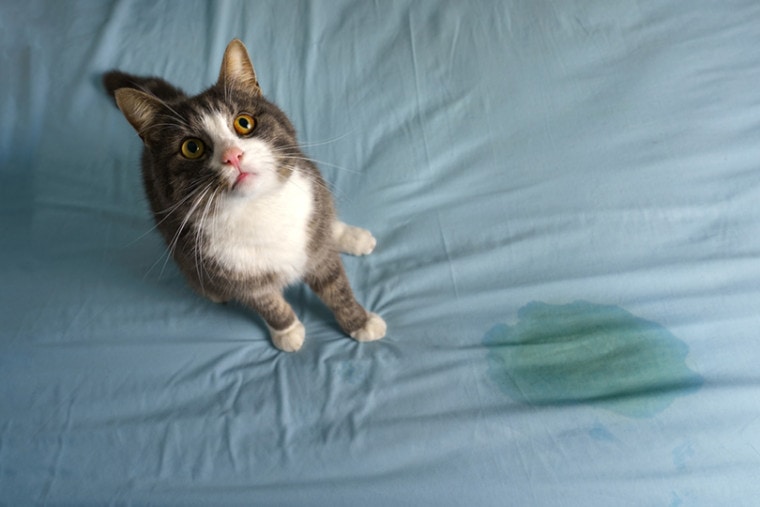
There are a few potential reasons why your cat has begun peeing on your bed—what you likely previously considered to be one of your few sacred spaces. When a cat starts going to the bathroom outside the litter box, it is time to evaluate the situation and see what could be going on.
This is undoubtedly a very frustrating issue to have, but we are here to help you get to the bottom of it. We have compiled a list of the possible reasons your cat is peeing on your bed, so let’s take a closer look.
Top 7 Reasons Cats Pee On Beds
1. Location of the Litter Box
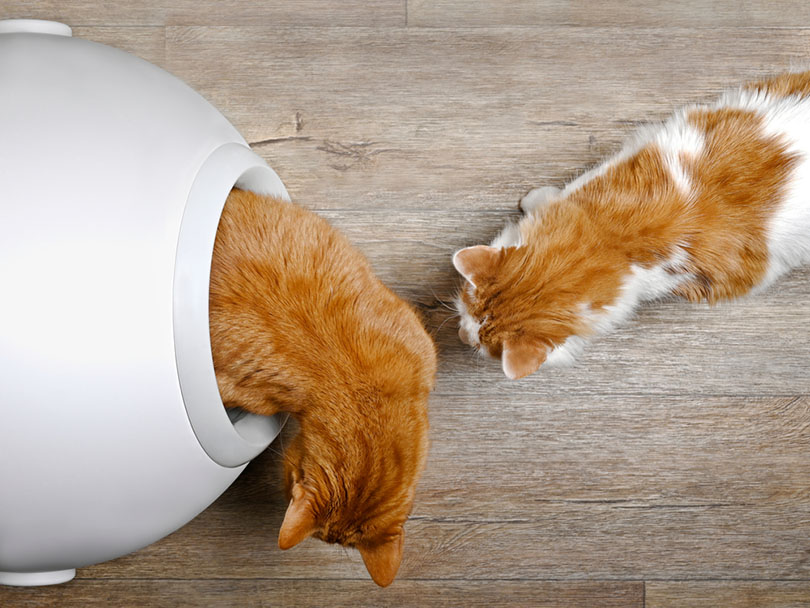
Cats can be very picky about the location of their litter box. Cats are naturally private animals when it comes to relieving themselves, and who can blame them? This is a natural behavior that is a result of vulnerability to predators in the wild when they stop doing their business. Your cat may not like the current location of the litter box due to lack of privacy, or the high traffic area surrounding it.
If litter box location is the problem, try finding a nice, quiet spot somewhere in the house to place the litter box. Giving your cat their desired privacy may be all it takes to get them back in the litter box and off your bed.
If you recently moved the litter box before the beginning of urination on the bed, this could be the cause. Try moving the litter box back to the original location or finding a more convenient spot and introducing your cat to it. You may have to block access to the bedrooms during this time to get your cat reacclimated to litter box usage.
2. Too Few Litter Boxes in the Home
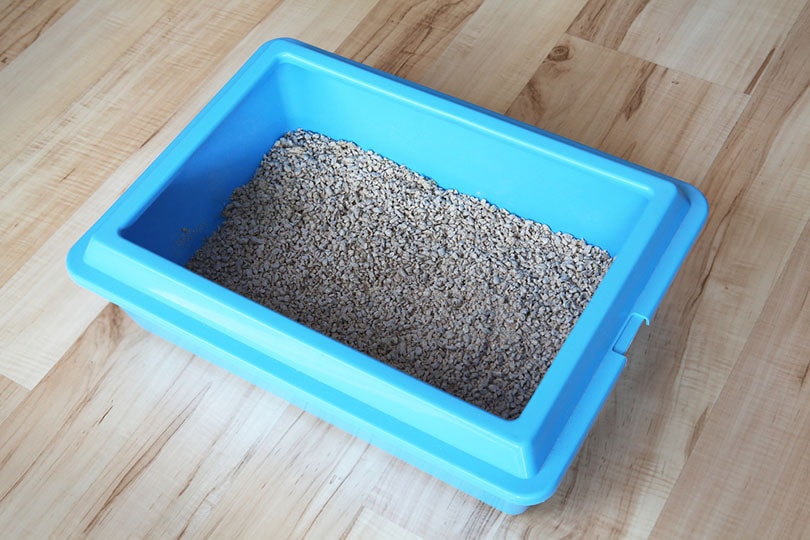
Multiple cat households need to have enough litter boxes for the number of cats in the home. At times, cats will refuse to use shared boxes, causing them to search elsewhere to relieve themselves.
It is advised to have one litter box per cat in the household plus an additional one. If you are lacking in the number of litter boxes in the house, run to the store or hop online and grab the appropriate number for the number of cats in your house. Hopefully, this is all you need to do to stop your cat from peeing on your bed.
3. Litter Box Design or Size
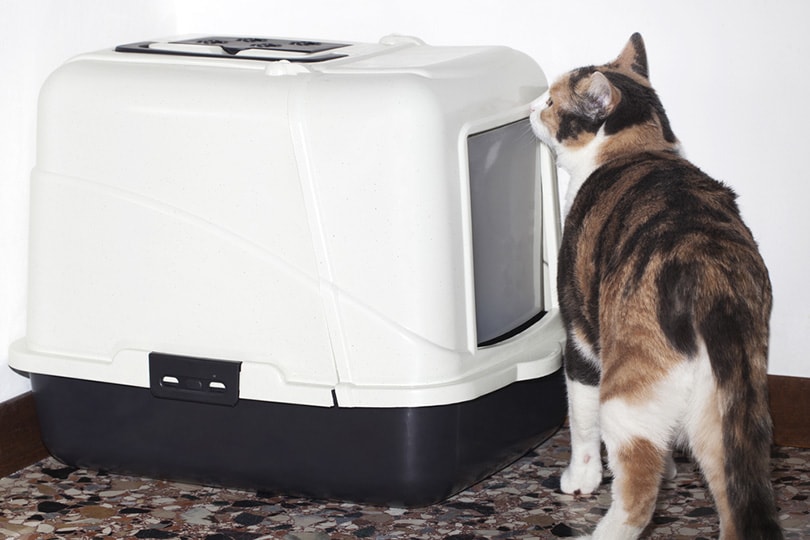
If you have recently changed the style or size of the litter box you have been using, this could result in your cat finding other places to go to the bathroom, including your bed. Cats are finicky little creatures that can have very peculiar preferences. Each individual will have their preferences so only you will be able to determine if this is an issue for your cat.
Ask yourself a few questions to help you determine if this could be the reason for your cat’s newly acquired elimination behavior. Did you switch from an open box to one with a hood? Did you buy a smaller litter box than the previous one? Are you now using a litter box that has a different entry point than one they were comfortable with?
If litter box size or design is the culprit, it is advised to go back to the litter box style that your cat comfortably used. Make sure to reintroduce them to the box and even block access to your bedroom if need be, as you try to correct this behavior.
4. Type of Litter

Did you recently try a new type of litter for the household? If so, this could be the reason your sheets are the new cat toilet. Cats can become comfortable with a certain type of litter and can be completely deterred if that were to change. If you usually use clay litter but switched to something like crystals or pine litter (or vice versa,) that could be your problem.
If you recently swapped litter types right before your bed fell victim to your cat’s bathroom habits, try swapping the new litter out for the old style to see if this makes a difference. If it is a matter of comfortability, your cat may readjust to their old litter with ease.
5. The Litter Box Is Not Clean Enough

Have you been keeping up with routine cleaning of the litter box? Unclean litter boxes can prompt cats to go elsewhere. Our cuddly little feline friends like to be clean and tidy. They don’t just limit their tidiness to their self-grooming; they want their bathroom quarters to be nice and clean. If you have neglected the litter box and it has been fuller than usual, your clean bed may have been much too inviting.
The good news about this potential issue is that it is very easy to solve with a litter scooper. Make the litter box more comfortable and inviting by getting it cleaned up. Thorough cleaning and scrubbing of the entire box is a good idea so that your cat can have a fresh start with a flawlessly clean litter box. Make sure to keep up on the daily cleaning to prevent this issue from happening again.
Even if you keep a clean and tidy litterbox, you probably still find yourself with cat odors and stains around the house – but with the Hepper Advanced Bio-Enzyme Pet Stain & Odor Eliminator Spray, you can permanently remove even the very worst pet stains and smells! Click here to learn more and get yourself a bottle.
- ADVANCED ENZYMATIC CLEANER - Penetrates the most stubborn smells and stains at the deepest molecular...
- FOR ANY MESS, ON ANY SURFACE - This pet odor eliminator cleans your carpets, floors, furniture,...
- FRESH, NATURAL ODOR - Our unique formulation doesn't rely on dangerous or unpleasant chemical...
At Pet Keen, we’ve admired Hepper for many years, and decided to take a controlling ownership interest so that we could benefit from the outstanding products of this cool cat company!
6. Stress/Fear

Cats are very sensitive to their environment and any changes in their daily routine can cause them a significant amount of stress. When cats are stressed, their behavior can change drastically, so much so that it is common for pet owners to worry about their overall health. If you notice any significant behavioral differences, you need to get in touch with your veterinarian to get a proper evaluation done. If your cat has recently started peeing on your bed after a noticeable change in lifestyle or routine, that could be the culprit.
In addition to stress from change, fear can also cause this behavior. Are there new people or animals within the household? Is there anyone coming and going from the home that is different from the norm? Fear is a powerful emotion that can have your cat hiding in odd places and using the bathroom outside the litter box.
Try and think of what kind of stressors could be affecting your cat or causing them fear. Even the smallest of changes to routine can cause your cat to experience stress and anxiety.
If you are aware of an upcoming drastic change to your lifestyle or routine, try and get ahead of the problem by working with your veterinarian to help reduce your cat’s stress load. Some cats are more sensitive to these types of behavioral issues than others. Always contact your veterinarian to rule out any underlying health issues.
7. Health Issues
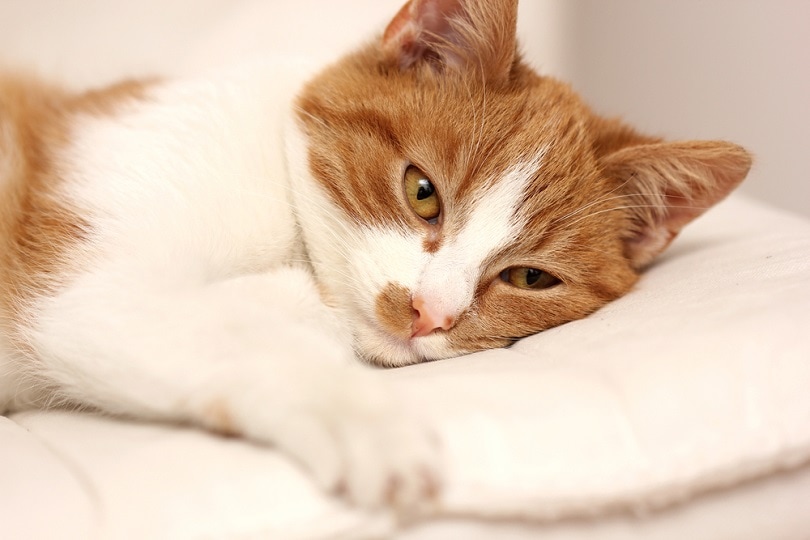
Underlying health issues can cause drastic changes in your cat’s urination habits. Your cat could have a medical condition that is making it difficult to make it to the litter box, or they could be in too much pain to get in and out of the litter box.
Medical issues such as urinary tract infection, feline interstitial cystitis, bladder stones, and kidney stones are all potential causes. Even medical conditions that are unrelated to the kidneys and bladder could cause changes in cats’ bathroom habits.
If your cat is suddenly urinating on your bed, there is always the possibility that it is due to an underlying medical condition. You need to contact your veterinarian immediately so that you can have your cat properly evaluated and diagnosed.
Conclusion
Having your cat suddenly start peeing on your bed is a frustrating nightmare. You must contact your veterinarian if you have observed this behavior so that you can first rule out any underlying medical conditions that could be the cause. Once health issues are ruled out as a cause, you can start evaluating the situation further to try and determine the exact cause of this unwanted and very messy behavior. Once you identify the problem, you can work toward a solution.
Featured Image Credit: Creative Cat Studio, Shutterstock







